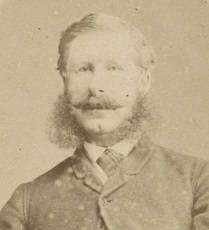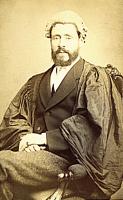Related Research Articles

John Parkin Taylor was a 19th-century New Zealand runholder, and a politician in Otago and Southland. In his early life, Taylor lived in various countries and studied languages in Germany. He worked as a merchant and was married when he returned to England. Taylor's family emigrated to New Zealand in 1849 and he was a sheep farmer in various parts of the South Island before finally settling on a run near Riverton in Southland, where he had his homestead 'Waldeck' built. He entered the House of Representatives for the Dunedin Country electorate through a by-election in 1858 but fell out with many of his constituents over a broken election promise, as he helped the Southland Province to break away from the Otago Province. He eventually became Southland's second Superintendent and served from 1865 to 1869, and also represented an electorate on the Southland Provincial Council for a few months. In 1865, he was appointed to the New Zealand Legislative Council and with one break in membership due to non-attendance, he remained a member until his death. He served for one year as mayor of Riverton (1872–73) but did not stand again due to poor health. Taylor had a painful illness and died in 1875.
Awarua was a New Zealand parliamentary electorate from 1881 to 1996.
Wallace was a New Zealand parliamentary electorate. It was established in 1858, the first election held in 1859, and existed until 1996. From 1861 to 66, it was represented by two members. In total, there were 18 Members of Parliament from the Wallace electorate.
Buller is a former New Zealand parliamentary electorate, from 1871 to 1972. It was represented by eleven Members of Parliament.
Chalmers, originally Port Chalmers, was a parliamentary electorate in the Otago Region of New Zealand, from 1866 to 1938 with a break from 1896 to 1902. It was named after the town of Port Chalmers, the main port of Dunedin and Otago.
Moeraki was a parliamentary electorate in the Otago region of New Zealand, from 1881 to 1887.
Waikouaiti was a parliamentary electorate in the Otago region of New Zealand, from 1866 to 1908.
Kaiapoi was a rural New Zealand electorate, north of Christchurch in the Canterbury region of New Zealand from 1861 to 1946. It was represented by twelve Members of Parliament.
Mataura was a parliamentary electorate in the Southland Region of New Zealand, from 1866 to 1946.
Hokonui was a parliamentary electorate in the Southland region of New Zealand, from 1881 to 1890.
Roslyn was a parliamentary electorate in the city of Dunedin in the Otago region of New Zealand from 1866 to 1890.
Oamaru was a parliamentary electorate in the Otago region of New Zealand, during three periods between 1866 and 1978.
The 4th New Zealand Parliament was a term of the Parliament of New Zealand.

Donald Hankinson was a 19th-century Member of Parliament from Southland, New Zealand.
Lauchlan McGillivray was a 19th-century Member of Parliament from Southland, New Zealand.
Samuel Hodgkinson was a 19th-century Member of Parliament from Southland, New Zealand.
The 8th New Zealand Parliament was a term of the New Zealand Parliament.
The 9th New Zealand Parliament was a term of the Parliament of New Zealand.

Peter Thomas Finn was a barrister in Victoria, Australia and Invercargill, New Zealand. For a short time, he was a member of the Victorian Legislative Assembly for the electorate of Avoca.
The 1870 Riverton by-election was a by-election held on 18 March 1870 during the 4th New Zealand Parliament in the Southland electorate of Riverton.